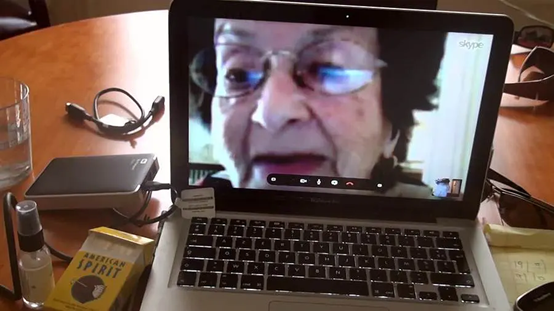This is the illusion of cinema: just as things appear, as we are about grasp them, they disappear.
— Lesley Stern, DEAD AND ALIVE
This piece is inspired by Peter Wollen’s “An Alphabet of Cinema.” The alphabet is a form that connects the fragments like letters, words, images, and the lines in reading with the flow of sound, consequence, personal history, and various emotions. It provides a space that allows things to freely merge and creatively spread.
F is for Fading. Fading out is an editing technique, but it is also the “fading” of memory, as when Michael quotes from Neruda: “Love is so short, forgetting is so long.” Forgetting can be regarded as a process of fading: the Diane who cannot stop from falling in love, the mom who lives in chaos, the woman with a tender body and joyful, loud voice, fades into the pictures of noisy pixels—she turns into things. Then the lifeless things compose vivid stories. Stories, the synonym of tales, means something different from our lives and sometimes contains the fantasy of the storyteller. Fading is one of the essences of the world we live in, it happens everywhere, every moment, to everyone. For example, it can be the opening of a film: at the beginning of Stories We Tell, I am like a passenger on the train through the snowfield, fading into the vintage images of a blonde woman—she is dancing around, laughing like there is no tomorrow, drinking with friends, rushing in to the house and backstage, kissing a child—then when everyone enters the frame to attend his funeral, she is replaced by the “stories” in blurry handwriting. The images fade out into the blank black screen, it is a cinematic closing of her coffin lid. Although fading not only happens when something is over, or when some people are gone, it is a process of taking away as Venice gradually sinks into the Adriatic Sea; fading can never be caught by hands, just like hands can never capture time. Time is like water that washes everything to fade—it is a hackneyed metaphor, and a truism. Time makes people old; aging is also one kind of fading. In No Home Movie, every time Chantal visits her mother, the camera records the gradual, subtle, and inevitably fading of her mother. Watching an old woman talk about her youth, about how she is now graying from head to toe, and then the next moment she is even older, too old to move, to laugh, and eat, so old she can only sleep. Can we say that fading is people stepping into the state of things? A person who has existed vividly with all her rich and splendid, painful and heavy memories will eventually fade into an empty house pierced by sunlight, a wasteland full of silence, fades to ashes in the mountains and deserts.
G can only stand for my grandmother, an old woman whose image occupied the earliest memory. She was the first one who came to my mind when I watched No Home Movie. I’m so familiar with the feeling of watching an old person fade, it is the most frightening realization I have about death. Since her fortuneteller said that she can only live to seventy, the spatial relation created by things haunted me. Every time she leaves me alone at her house (a home that only belongs to us after my grandfather passed away) for grocery shopping or picking up a daily newspaper, the childish anxiety will sneak out of every object inside that space. I stayed and stared at the house: it was occupied by the furniture that had been used for thirty years. My deceased grandfather’s portrait, my mother’s childhood picture, my kindergarten paintings, and the clothes she hung out on the balcony. Like what Lesley Stern wrote, when past, present, and future meet in the temporality, it is a slow burn. But without the presence, the house filled with things and images only makes me feel empty. The words of that prediction occupied this void. So I asked myself: will it be forever empty when my grandmother leaves me? Her house became a space for me to rehearse about her death. But I could not tell anyone about my awkward fear. I swallowed it, like swallowing the hardest bread in the world. As Maggie Nelson writes, it is unreasonable to talk about cure when you have not yet started your disease.[i] The story seems to have a good end: my grandmother safely celebrated her seventy-fifth birthday. However, the fear and the precautionary mourning did not simply disappear, because I am old enough to know—fading is a long and lasting farewell. Time can turn the Sword of Damocles into a tiny needle, as Ross Gay describes: it “seems to pierce us, drive a hole through us.”[ii] When I visually enter the home of Chantal’s mother, as an alternative universe to what I used to imagine, fear and emptiness become real, through sequence by sequence, till the end of the progress bar on the video screen. I can never dare to say: “I empathize with her.” She lost her mother; the fragile barrier impedes her own death.
H, obviously, could be home, but I prefer another word: Homecoming. When Professor McKim told us that we should always have a reader in our mind, I thought about my grandmother again (although she cannot read any English). After I grew up, I left her home and even left China; there are 10,000 miles in distance, 16 hours of flight between us. She already packed my belongings and stored them in the basement. In No Home Movie, Chantal said: “I want to show that there is no distance in the world.” But her mother responds: “She never tells me anything important.” It reminds me about our same routine when we make phone calls every time. The distance is not only a geographical thing, it also exists in the unreversed past. Though I heard countless stories about the Cultural Revolution, the Great Chinese Famine, and how my grandfather died, those are stories for me, but life for her. Just like Chantal’s mother is made by the traumatic memory in Auschwitz, she left one part of herself at the time before giving birth to her daughter. It is a colorless and odorless poison that causes a slow death, and it transmits to Chantal through their blood and bond. The space they shared called “home” reminds me of Professor McKim’s interpretation of the title of the film “Rushmore”: it is “a means of understanding each other, as ‘my Rushmore’ yields both intimacy and distance.”[iii] The term “home” also makes me wonder: how does my home become yours? How does it become ours? Just like Sarah Polley’s experiment: everyone has a different story to tell. That’s why I think there is no possibility of “homecoming” for Chantal, because she can never return to the time of Holocaust and ages of exile to give company to and embrace her mother—the beautiful woman called Natalie. There is also no possibility of “homecoming” for her mother, the home she used to have has faded into the ashes of history. So, what is their home? It’s a place for extended and rehearsed mourning. A place where all things react and affect each other. A place like a story of “One Thousand and One Nights” that tries to slow down the pace of death through telling and hearing, food and cooking, the joining of personal wildernesses, and delight within the annihilation, a dwelling in image and movie. Film is Chantel’s refuge for her vulnerability, once the way to approach the eternal home is an endless journey from birth to death, film is an illusional substitute she can grasp and own for a lonely night. If homecoming is too far, then return to the stop of art, beauty, and image.
I should be “I,” but I’d like to have a more interesting word: Ink. When people write down something, they attempt to keep it for a longer period, to affirm its existence in this world. Like Michael keeps Diane in his heart by his handwriting, his love may be revived when their children, and children’s children, read it. Ink is more reliable than memory, so that sometimes it reaches beyond life itself. Ink is the fluid weapon against fading—the laughter, tears, and images are transcribed onto paper and ink. It is a specimen of time. It is like diamond: not only because both ink and diamond are composed of carbon, but also for ink’s preciousness and the writer’s patience and love in it is nothing less than polishing a diamond. When I start to write by pen, I recognize that this probably is what my grandmother wants to have taught me when she guided me how to read and write my first language: “Writing a word over and over again carefully, then you won’t forget it.” If memory can be compared to a dream, then ink is the medium that turns the illusion into a real thing. Ink might blur or be lost someday; perhaps, the world will end before it fades. F is for Forever.
Author Biography
Quillan Qian is a student studying Comparative Literature at Hampshire College. She is interested in building conversation among multimedia, literature, and literary theory.
[i] Nelson, Maggie. Bluets. Wave Books, 2009, p. 7.
[ii] Gay, Ross. The Book of Delights. Algonquin Books of Chapel Hill, 2019, p. 46.
[iii] McKim, Kristi. “Glory Fades and Shines: On Rushmore and Empathy.” Bennington Review, no. 3, July 2017, p. 238.









































